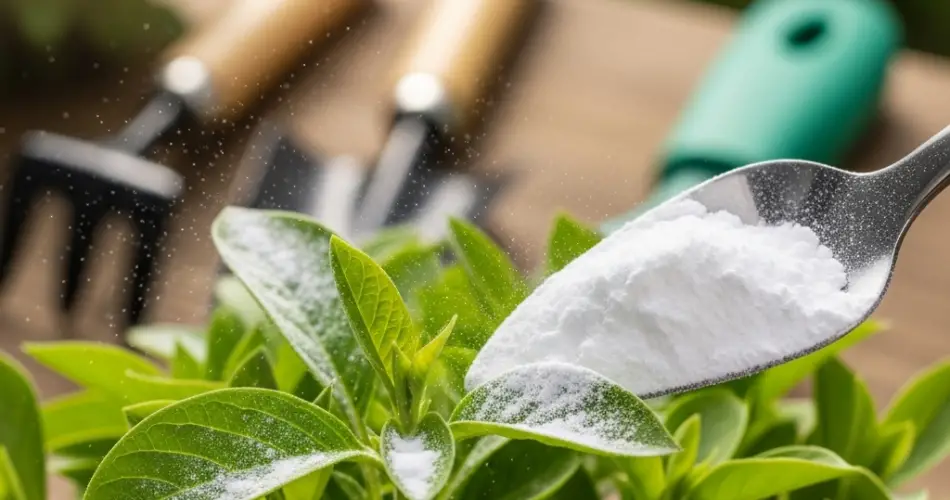Baking soda, known scientifically as sodium bicarbonate, is a humble ingredient found in nearly every kitchen. While it’s most commonly used in baking and cleaning, it also holds a surprising number of benefits for gardeners. This versatile white powder can help improve plant health, protect against diseases, and even keep garden pests at bay—all without the need for synthetic chemicals.
If you’re looking for a simple, eco-friendly solution to common gardening problems, baking soda might be just the secret ingredient your garden needs.
Why Baking Soda Works
Baking soda is a mild alkaline substance. When used in moderation, it can alter the pH of plant surfaces or soil slightly—creating conditions that discourage fungal growth and deter insects. Its gentle, natural properties make it safe to use on edible plants, flowers, and in compost.
Here are some of its key benefits:
-
Acts as a natural fungicide
-
Helps repel certain garden pests
-
Can freshen compost and reduce odor
-
Useful for cleaning garden tools and pots
Let’s explore the many ways you can use baking soda to support a healthy, vibrant garden.
1. Prevent and Treat Fungal Diseases
Fungal issues such as powdery mildew, black spot, and leaf mold are common in vegetable and ornamental gardens. Baking soda can be used to create a simple anti-fungal spray.
DIY Anti-Fungal Spray
-
1 tablespoon baking soda
-
1 tablespoon horticultural or vegetable oil
-
1 teaspoon mild liquid soap (castile or biodegradable dish soap)
-
1 liter of water
Mix well and spray the solution onto plant leaves, especially on the undersides. Use weekly during warm, humid weather, or at the first sign of fungal disease. Always test on a small portion of the plant first to ensure it doesn’t cause sensitivity.
Avoid spraying during the hottest part of the day, as this can burn leaves.
2. Deter Pests Naturally
Baking soda won’t kill insects outright, but when combined with other natural ingredients, it can help repel soft-bodied pests like aphids, spider mites, and whiteflies.
DIY Pest-Repelling Spray
-
1 tablespoon baking soda
-
1 teaspoon neem oil (optional for added effect)
-
1 teaspoon mild liquid soap
-
1 liter of water
Spray this mixture on plants every 7–10 days. Focus on tender new growth and the undersides of leaves, where pests tend to gather. This solution is especially effective on herbs, vegetables, and flowering plants prone to insect problems.
3. Sweeten Tomato Flavor
Some gardeners claim that baking soda can help reduce soil acidity around tomato plants, potentially leading to sweeter fruit. While results vary depending on soil conditions, it’s worth trying in moderation.
How to Apply:
Sprinkle a small amount (1–2 teaspoons) of baking soda around the base of each tomato plant once a month. Avoid direct contact with the stem and leaves. Water afterward to help the baking soda soak into the soil.
4. Weed Control in Cracks
If you have weeds growing between patio tiles, sidewalk cracks, or bricks, baking soda can act as a natural weed deterrent. Simply pour or sprinkle a thick line of baking soda into the cracks and sweep it in. It will create an inhospitable environment for weeds to regrow.
Caution: Avoid using baking soda near flower beds or vegetables—it can alter soil pH and damage nearby plants if overapplied.
5. Neutralize Compost Odor
Compost piles can develop strong odors, especially if they’re high in nitrogen (like kitchen scraps). Baking soda helps absorb unpleasant smells and balance pH.
Sprinkle a light dusting of baking soda onto your compost pile or bin occasionally to reduce odor. Use sparingly, as too much can interfere with microbial activity essential to the composting process.
6. Clean Tools and Containers
Garden tools, pots, and containers can accumulate grime, mineral deposits, and pathogens. Baking soda is a gentle abrasive that cleans and deodorizes without harsh chemicals.
To Clean Tools:
Mix baking soda with a bit of water to make a paste. Use a cloth or scrub brush to clean tools, then rinse and dry thoroughly.
For Containers:
Soak pots in a solution of ¼ cup baking soda and 2 liters of water for 30 minutes. Scrub and rinse to prepare them for new plantings.
7. A Word of Caution
Although baking soda is generally safe, overuse can cause imbalances in soil pH and harm plant roots. Always test sprays on a small area first and use measured amounts. It’s also best to avoid repeated applications near acid-loving plants like blueberries, azaleas, or hydrangeas, as they prefer low-pH soils.
Final Thoughts
Baking soda may be a kitchen staple, but it holds surprising power in the garden. From controlling fungus and pests to cleaning tools and sweetening soil, it offers a natural and cost-effective solution to many common gardening challenges.
By using this simple ingredient wisely, you can reduce your reliance on chemical products, improve plant health, and enjoy a more sustainable gardening experience.
So next time you reach for baking soda to whip up a cake or clean your sink, consider setting some aside for your garden—your plants will thank you.



